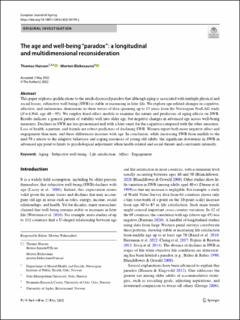| dc.contributor.author | Hansen, Thomas | |
| dc.contributor.author | Blekesaune, Morten | |
| dc.date.accessioned | 2022-09-27T13:15:56Z | |
| dc.date.available | 2022-09-27T13:15:56Z | |
| dc.date.created | 2022-06-09T09:34:45Z | |
| dc.date.issued | 2022-05-23 | |
| dc.identifier.citation | European Journal of Ageing. 2022, . | en_US |
| dc.identifier.issn | 1613-9372 | |
| dc.identifier.issn | 1613-9380 | |
| dc.identifier.uri | https://hdl.handle.net/11250/3021826 | |
| dc.description.abstract | This paper explores qualifcations to the much-discussed paradox that although aging is associated with multiple physical and social losses, subjective well-being (SWB) is stable or increasing in later life. We explore age-related changes in cognitive, afective, and eudaimonic dimensions in three waves of data spanning up to 15 years from the Norwegian NorLAG study (N=4,944, age 40−95). We employ fxed-efect models to examine the nature and predictors of aging efects on SWB. Results indicate a general pattern of stability well into older age, but negative changes in advanced age across well-being measures. Declines in SWB are less pronounced and with a later onset for the cognitive compared with the other measures. Loss of health, a partner, and friends are robust predictors of declining SWB. Women report both more negative afect and engagement than men, and these diferences increase with age. In conclusion, while increasing SWB from midlife to the mid-70 s attests to the adaptive behaviors and coping resources of young-old adults, the signifcant downturns in SWB in advanced age point to limits to psychological adjustment when health-related and social threats and constraints intensify. | en_US |
| dc.description.sponsorship | Open access funding provided by Norwegian Institute of Public Health (FHI). This work was supported by the Research Council of
Norway (Grant no. 299859). | en_US |
| dc.language.iso | eng | en_US |
| dc.publisher | Springer | en_US |
| dc.relation.ispartofseries | European Journal of Ageing;19 | |
| dc.rights | Navngivelse 4.0 Internasjonal | * |
| dc.rights.uri | http://creativecommons.org/licenses/by/4.0/deed.no | * |
| dc.subject | Aging | en_US |
| dc.subject | Subjective well-being | en_US |
| dc.subject | Life satisfaction | en_US |
| dc.subject | Affect | en_US |
| dc.subject | Engagement | en_US |
| dc.title | The age and well-being “paradox”: a longitudinal and multidimensional reconsideration | en_US |
| dc.type | Peer reviewed | en_US |
| dc.type | Journal article | en_US |
| dc.description.version | publishedVersion | en_US |
| dc.rights.holder | © The Author(s) 2022 | en_US |
| cristin.ispublished | true | |
| cristin.fulltext | postprint | |
| cristin.fulltext | original | |
| cristin.qualitycode | 1 | |
| dc.identifier.doi | https://doi.org/10.1007/s10433-022-00709-y | |
| dc.identifier.cristin | 2030383 | |
| dc.source.journal | European Journal of Ageing | en_US |
| dc.source.volume | 19 | en_US |
| dc.source.pagenumber | 1-10 | en_US |
| dc.relation.project | Norges forskningsråd: 299859 | en_US |
| dc.relation.project | Norges forskningsråd: 327659 | en_US |

